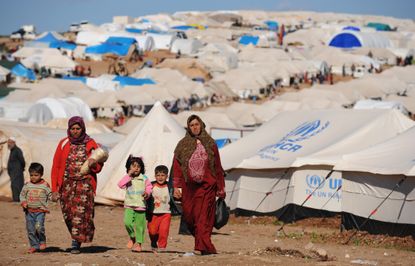Here's a safe, dead simple way for the U.S. to play a useful role in Syria's civil war
The U.S. has the space, the resources, and the culture to take in a lot more refugees


The Syrian civil war has killed some 200,000 people, but it has also left more than four million refugees in foreign countries. This has sparked a massive political crisis in the European Union. With many EU states suffering from economic collapse, and nativist politics on the rise, governments are doing all they can to avoid fulfilling their statutory obligations and push the burden of refugees on someone else.
One laudable exception to this trend has been Germany, which has taken in some 40 percent of the total refugees admitted to the EU thus far (Greece, Spain, and Italy have taken in another 25 percent together). To expedite more applications in Germany, the government there has suspended the EU protocol that stipulates that refugees must apply for asylum in the first country they reach, and Chancellor Angela Merkel has argued fiercely against anti-immigrant German activists.
This is an area where the United States can do an uncommon amount of good. Not only is the U.S. far larger than any European country, it is also more immigrant-friendly than most of them (the despicable race-baiting xenophobe currently leading the GOP primary notwithstanding). Compared to the vast sums spent on the military, it would be cheap and logistically straightforward. Better still, it would do a great deal of guaranteed humanitarian good.
Subscribe to The Week
Escape your echo chamber. Get the facts behind the news, plus analysis from multiple perspectives.

Sign up for The Week's Free Newsletters
From our morning news briefing to a weekly Good News Newsletter, get the best of The Week delivered directly to your inbox.
From our morning news briefing to a weekly Good News Newsletter, get the best of The Week delivered directly to your inbox.
When presented with this option, anti-immigration types (the ones who aren't baldly racist, anyway) typically complain about the expense and danger of accommodating lots of new desperate people. But while it would be a bit of an administrative pain in the neck, the truth is that we could spend all the money necessary to accommodate all four million Syrian refugees without blinking an eye. (Lebanon, a middle-income country of four million the size of a small U.S. state, is currently accommodating over a million Syrian refugees.)
It would require obtaining some housing, doing some security checks, visiting with social workers, and so forth. But America is an extremely wealthy country. This is a place that's going to waste over a trillion dollars on a broken fighter plane that is already outdated. A few hundred thousand new people would take up a tenth of a percent or two in the federal budget, if that.
Moreover, America already makes room for thousands of refugees every year. Here's something I bet you didn't know: Last year the United States took in 70,000 refugees. The year before that, we took in 70,000 more. The year before that, about 58,000, and so on. Overall, since 1975, the U.S. has resettled more than three million refugees — over 200,000 in 1980 alone. Every year, tens of thousands of desperate people are absorbed into American society, and unless you're directly involved with some of them, chances are you probably didn't even notice. In a country this huge and diverse, there is a lot of space for people to hunker down and live their lives.
That leaves the "danger" of terrorism and crime. This is another fake concern — immigrants actually commit less crime than native-born Americans — but it also raises the question of perspective. There are tens of thousands of gun deaths in the U.S. every year. I watched a fellow journalist get shot to death on live television yesterday. But despite the ironclad evidence that stricter gun control would prevent at least some of those deaths, there will be no such policy. In a country where murder sprees are an almost-daily occurrence, there's no reason to worry unduly about what refugees might do.
At any rate, every year, the government sets a cap for the number of refugees (this year it was 70,000 again), and recently it announced it would allow up to 8,000 Syrian refugees next year. That's a worthwhile start, but if developed nations are going to share the burden relatively equally, it's not even close to our fair share. Reportedly Germany is going to accommodate about 800,000 this year; America could start with half of that.
America has the money and the space, and is deeply accustomed to new people arriving en masse. There is no reason we shouldn't rescue these people, especially when it reduces strains on countries in the Middle East and Europe that are our allies.
Create an account with the same email registered to your subscription to unlock access.
Sign up for Today's Best Articles in your inbox
A free daily email with the biggest news stories of the day – and the best features from TheWeek.com
Ryan Cooper is a national correspondent at TheWeek.com. His work has appeared in the Washington Monthly, The New Republic, and the Washington Post.
-
 Magazine interactive crossword - April 26, 2024
Magazine interactive crossword - April 26, 2024Puzzles and Quizzes Issue - April 26, 2024
By The Week US Published
-
 Magazine solutions - April 26, 2024
Magazine solutions - April 26, 2024Puzzles and Quizzes Issue - April 26, 2024
By The Week US Published
-
 Magazine printables - April 26, 2024
Magazine printables - April 26, 2024Puzzles and Quizzes Issue - April 26, 2024
By The Week US Published
-
 Bombing at girls' school in Kabul kills at least 50, including students
Bombing at girls' school in Kabul kills at least 50, including studentsSpeed Read
By Tim O'Donnell Published
-
 Garland says DOJ is 'pouring its resources' into stopping domestic terrorists 'before they can attack'
Garland says DOJ is 'pouring its resources' into stopping domestic terrorists 'before they can attack'Speed Read
By Catherine Garcia Published
-
 Suspected Israeli cyberattack on Iranian nuclear site complicates U.S.-Iran nuclear deal talks
Suspected Israeli cyberattack on Iranian nuclear site complicates U.S.-Iran nuclear deal talksSpeed Read
By Peter Weber Published
-
 North Korea fires 2 ballistic missiles into sea
North Korea fires 2 ballistic missiles into seaSpeed Read
By Peter Weber Last updated
-
 U.S. airstrikes target Iranian-backed militia facilities in Syria
U.S. airstrikes target Iranian-backed militia facilities in SyriaSpeed Read
By Catherine Garcia Published
-
 Rochester police who killed Daniel Prude during mental health crisis won't face charges
Rochester police who killed Daniel Prude during mental health crisis won't face chargesSpeed Read
By Kathryn Krawczyk Published
-
 Mike Pence's 'nuclear football' was also apparently at risk during the Capitol siege
Mike Pence's 'nuclear football' was also apparently at risk during the Capitol siegeSpeed Read
By Peter Weber Published
-
 Trump publicly attacked Pence during the Capitol riot knowing Pence was in trouble, GOP senator suggests
Trump publicly attacked Pence during the Capitol riot knowing Pence was in trouble, GOP senator suggestsSpeed Read
By Peter Weber Published